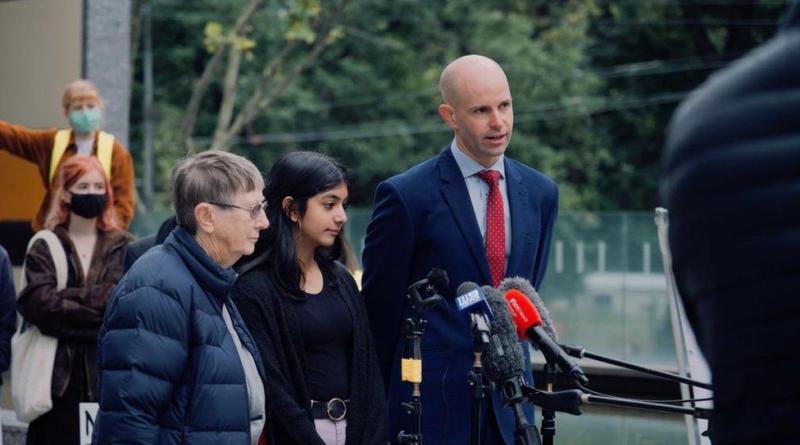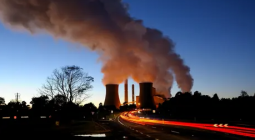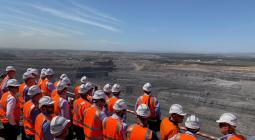The teenagers and the nun trying to stop an Australian coal mine

When eight teenagers and an elderly nun in Australia teamed up for a climate case, they won, in a historic judgement. Their case has now been appealed by the country's government. If the final verdict swings in their favour, it will have ramifications not just for Australian law but for climate cases world-wide.
In May this year, Anjali Sharma was sitting in her economics class at school in Melbourne when the court in Sydney live-streamed the results of a climate case she had found herself at the centre of. It took a while to sink in.
"To me it all just sounded like jargon. It took a briefing from my legal team to understand the magnitude of what had happened," she says.
At that moment 17-year-old Ms Sharma and the seven other teenagers involved in her case had made history. Alongside 87-year-old Catholic nun Brigid Arthur, who acted as the young people's legal guardian, they'd taken Australia's environment minister, Sussan Ley, to court - and won.
"It felt really rewarding to be able to engage in something so historic for Australia, and needed too," says Ms Sharma.
Their case attempted to stop the expansion of the Vickery coal mine in New South Wales, which is estimated to add an extra 170 million tonnes of fossil fuel emissions to the atmosphere.
The judge in their case, Mordy Bromberg, ruled that the government had a duty to protect young people against future harm related to climate change. It's the first time in the world that a duty of care of this kind has been recognised.
Justice Bromberg did not, however, grant them an injunction to prevent the expansion of the mine. In his view, the court didn't have any evidence that Sussan Ley would actually approve the extension, and any injunction would be pre-emptive.
Yet in September Ms Ley approved the extension of the Vickery coal mine, as well as three others since then. The government is also appealing the decision in the Sharma case - the outcome of which is due soon.
The government used a "substitution argument" as one reason to approve Vickery, says the lawyer representing the Sharma case, David Barnden.
"It's the argument that if this particular coal project didn't go ahead, it wouldn't make a difference to the total amount of emissions because effectively the market would fulfill that demand. That's otherwise known as the drug dealer's defence - it's the idea that 'If I don't deal drugs then somebody else will.'"
For Sister Brigid Arthur, the minister's decisions since the success of their case are "quite provocative".
Sister Arthur has spent a lifetime working with young people. For over two decades she has been acting as a litigation guardian - instructing lawyers on behalf of those who can't represent themselves - in cases mostly involving refugees. Before that she was a secondary school teacher. This is her first environmental case.
"It's engaged young people in a way that seems quite extraordinary. It's certainly for me something new," she says.
She was approached by lawyers just over a year ago who asked her to act as the teenagers' litigation guardian. She didn't take much convincing.
"I'm pretty passionate about climate change and while I don't work directly in this area, I'm very conscious of the fact that it's important for people to do what they can.
"Young people are the ones who will inherit whatever we're doing now, so they have every right to be calling people to account."
In speaking out, Ms Sharma has made herself a target for attacks.
"I've been messaged a lot of threats," she says.
"Some of the big news sources in Australia have, I guess, quite a right-wing following, so when news sources like that have covered my story I learned really quickly not to read the comments."
A 2019 report which investigated four publications owned by Australia's most powerful media company, News Corp Australia, argued that they promoted climate scepticism. Of over 8,000 articles analysed, 45% of all items either rejected or cast doubt upon consensus scientific findings.
In response, a News Corp Australia spokesman said the year-old report was "imbalanced" and coming from "a political activist group with a history of bias against our company's journalism".
News Corp Australia recently has been viewed as softening its hostility towards climate action by advocating for net zero emissions by 2050.
Despite this, shortly before and during COP26, videos from News Corp-owned Sky News Australia were recycled and found traction on social media amongst climate sceptics.
One Sky News Australia segment in which the host condemns youth climate activists as "selfish, badly educated, virtue-signalling little turds" was shared by the head of the advocacy group the CO2 coalition and received over 45,000 likes and 16,000 retweets.
As the science of climate change has become harder to argue with, a growing and common tactic is often to shoot the messenger instead - often accusing them of hypocrisy.
"Comments like 'Oh, she's wearing jeans and I bet she doesn't know how much water goes into producing a pair of jeans,'" says Ms Sharma. "And you know, they're right. I do own a pair of jeans. But me not owning that pair of jeans is not going to cut Australia's emissions in half by 2030."
When Sister Brigid first met the teenagers, who knew each other through attending climate protests, she was struck by their passion. She describes them as a group of young people "who really believe in this, who feel like they can't stop".
"There are very few greys with young people," she says. "Everything is so black and white."
But for now, all they can do is wait for the result of the appeal to be announced.
Despite widespread recognition of the need to move away from coal, there are different approaches when it comes to putting that knowledge into practice. At the COP26 summit in Glasgow, coal became a point of contention after delegates from China and India requested a last-minute change to the agreement, switching the phrase "phase out" coal with "phase down".
The results of the appeal and their case could be game-changing - not only for Australia but for other parts of the world too.
A success in their case could signal an erosion in support for fossil fuel burning and extraction with more lawsuits of this kind ahead. But if the minister's appeal is successful, it could see courts effectively vacate the climate field.
Australia is the world's second-largest exporter of coal. Following the Glasgow summit, Australian Prime Minister Scott Morrison said the coal industry will be operating in the country for "decades to come". He added that the plan to achieve net zero by 2050 will not come at the cost of rural and regional Australians.
"The world is grappling with this collective action problem of climate change. Every mine has its part to play and every decision counts," says Mr Barnden.
"What the court found was that the emissions from this particular extension project could be the emissions that tip us over the edge to these nonlinear tipping points which would further accelerate climate change."
He hopes that the duty of care ruling - if maintained through the appeal process - can influence other jurisdictions and give hope to young people to be able to participate in the legal process.
"It's a very foundational legal case to approach the problems caused by climate change, and the principles of negligence exist in a whole range of common law countries, from the UK, to New Zealand, Canada and the US as well."
It's too soon to tell whether this case will provide a turning point on climate inaction. But for Ms Sharma and the other teenagers involved in her case, the time for action is now.
"I really hope the federal court realises that Australia is now running behind the rest of the world, and that the duty of care that my case seeks to establish is really, really needed right now."
More on climate change in Australia:
By Kayleen Devlin
BBC Monitoring






